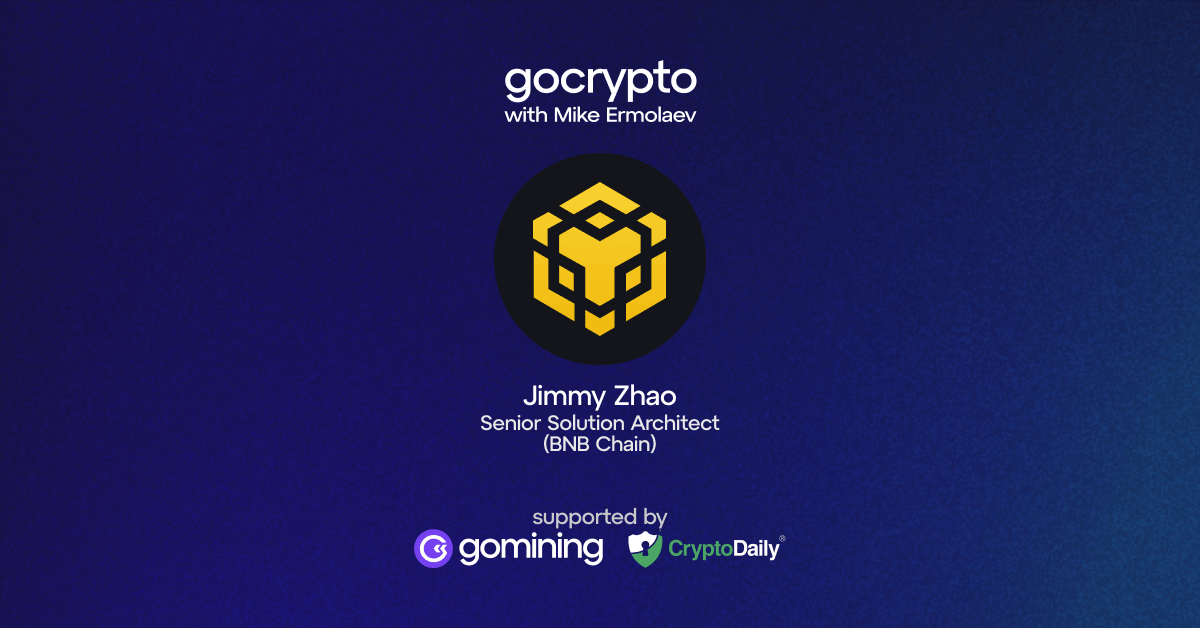Imagine a future shaped by AI working hand-in-hand with blockchain—it's happening now as these technologies revolutionize the digital landscape. Jimmy Zhao, Senior Solution Architect at BNB Chain, brings a wealth of experience from his previous roles at tech giants like Alibaba, HSBC, Huawei, and IBM, which exposed him to cutting-edge technologies and agile development methodologies, fostering a culture of innovation and collaboration. Mike Ermolaev had a chat with Jimmy about how AI and blockchain technology are blending these days and what this means for the industry in the future. This conversation, powered by GoMining, is part of the ongoing GoCrypto interview series.
Transition from Web2 to Web3
Zhao discussed the primary benefits of transitioning from Web2 to Web3 and how BNB Chain is facilitating this transition for developers and users.
"There are distinct benefits to transitioning from Web2 to Web3. One of the primary benefits lies in the shift from a centralized approach to a decentralized one. Web3 fosters transparency, efficiency, and adaptability in digital platforms—attributes that are increasingly valuable in today's digitally driven world," he explains.
He believes the fusion of Web3 technologies and AI holds unprecedented transformative potential and is the cornerstone of constructing the next-generation internet.
“When viewed through the lens of these developments, BNB Chain emerges as a key player in facilitating this shift to Web3. BNB Chain serves as an instrumental platform for developers, offering robust, high performance and developer friendly infrastructure and toolset to develop powerful AI applications. It's positioning itself not just as a transitional tool, but also as a transformative platform. Its design allows businesses to capitalize on AI's moat of big data, harnessing its analytical prowess to offer user-centric experiences and attain data-guided insights.
Challenges notwithstanding, the future of decentralized AI and how it could potentially revolutionize operations across sectors are intriguing. For instance, the integration of AI in industries such as healthcare or autonomous driving has already started transforming operations, optimizing processes and enhancing user experiences. As AI continues to evolve, it promises to radically reshape industries, drive economic growth, and create new opportunities. Owing to the practical applications and broader implications of Web3 AI, platforms like the BNB Chain can play an integral part in fast-tracking this digital transformation,” Jimmy highlights.
Integration of AI and Blockchain
Zhao elaborated on some of the most promising applications of AI and blockchain integration and how these technologies enhance capabilities in areas such as data security, trust, and efficiency.
“Blockchain's decentralized and encrypted nature fortifies data ownership and security while AI monitors and predicts potential threats, reinforcing the system's overall safety. Blockchain's transparent and immutable transactions enhance trust, which AI further bolsters through intelligent insights and autonomous contract execution. The combination of AI's data processing capabilities and blockchain's easy auditability also streamlines operations for improved efficiency across sectors, from real-time supply chain tracking to secure healthcare data sharing,” he explains.
Despite these promising synergies, Zhao acknowledges the challenges such as scalability, AI interoperability, and seamless integration of AI and blockchain.
“BNB Chain addresses these by continuously improving its infrastructure like decentralized storage network (BNB Greenfield) and EVM chains of BNB Smart chain and opBNB for better scalability, fostering a conducive environment for AI-blockchain integration and focusing on guidelines and infrastructure to manage complex AI algorithms. Through initiatives like Binance Labs and the MVB program, it enables developers to experiment, innovate, and leverage the full potential of AI and blockchain technologies,” he elaborates.
Advantages of Web3 AI Projects
When discussing the advantages of Web3 AI projects over traditional AI initiatives, Zhao highlights the shift from centralized to decentralized operations, “In the context of the rapid growth of the AI sector, valued at $136.55 billion in 2022 with an expected reach of $1.8 trillion by 2030, the idea of decentralization brings forth transparent, efficient, and inclusive possibilities.”
He notes that decentralizing AI optimizes ownership, security, and privacy, minimizing risks of breaches and unauthorized access.
“Conventional AI systems often have a single point of failure, exposing the entire network to potential threats. Conversely, decentralized systems distribute data across the network, minimizing risks of breaches and unauthorized access.
Additionally, Web3 AI projects enhance scalability and efficiency. Centralized systems might struggle with increased load, leading to bottlenecks and reduced performance. Decentralized AI, on the other hand, leverages a network of nodes, enabling improved overall performance and capacity to adapt and meet demand,” Jimmy explains.
According to him, the Web3 model also reduces bias and ensures fair outcomes by using diverse data inputs and distributed decision-making.
“Unlike centralized AI systems that might be influenced by monopolies or biased data sources, decentralized systems democratize access and foster an environment of collective intelligence.
Finally, decentralized AI projects, particularly on platforms like BNB Chain, offer tangible economic and societal impact. By allowing broad participation, these projects make AI technologies accessible to smaller players and individual developers. This approach ensures that AI's benefits are broadly distributed across society, rather than being concentrated within tech giants. Moreover, it fosters a competitive environment, driving innovation and protecting individual interests.
In summary, Web3 AI projects combine the power of AI with the decentralized, transparent, and user-centric ethos of the Web3 model. This fusion not only allows these projects to overcome the limitations inherent in traditional, centralized AI systems but also amplifies their potential to provide meaningful, far-reaching benefits,” Zhao adds.
Case Studies and Industry Insights
Jimmy Zhao highlights that the BNB Chain ecosystem is a hub for innovative AI projects enhancing user interactions, content creation, data management, and developer resources. Notable projects include MyShell, which supports AI-native application development and offers a transparent reward system, and ChainGPT, providing tools for smart contract generation, NFT creation, and crypto trading models.
Content generation platforms like NFPrompt and StoryChain use Web3 technology to allow users to create, own, socialize, and monetize their works. Smart bots like Web3go build data pre-processing layers for decentralized AI, improving data flow and AI agent development.
In the realm of data management and processing, Glacier Network and Web3go xData focus on scalable blockchain infrastructure and efficient data processing, respectively. Infrastructure services such as NetMind create a global network of computing power using idle GPUs, while Aggregata enhances data flow and decentralization. Developer tools like Aspecta and CodexField empower developers to create advanced AI applications. Finally, zkML projects like zkPass and BAS enhance privacy and security using zero-knowledge proofs and verify information within the BNB ecosystem, ensuring data privacy and control.
Future Implications and Vision
Looking ahead, Zhao envisions the fusion of AI and Web3 evolving significantly over the next few years.
“Leveraging blockchain technology, decentralized AI will eliminate the central points of control that currently dominate AI development. This shift will democratize access to AI resources, allowing a broader range of participants—including smaller entities and individual developers—to contribute to and benefit from AI advancements. By breaking down monopolies held by tech giants, decentralized AI will foster a more competitive and diverse ecosystem, spurring innovation and ensuring that AI technologies evolve to meet a wider array of societal needs,” he predicts.
Zhao believes decentralized AI will also promote smart cities and autonomous driving.
“By tokenizing data, decentralized AI can establish a market mechanism for data ownership, fostering a more equitable and sustainable data ecosystem. This approach ensures that users retain control over their personal information, enhancing trust in AI systems. The integration of edge computing will further enhance decentralized AI by allowing data processing to occur closer to the data source. This reduces latency, decreases bandwidth usage, and enables real-time AI applications, which are critical for scenarios like autonomous driving and smart city infrastructures,” he asserts.
Finally, Zhao predicts that decentralized AI will facilitate collaborative intelligence by leveraging federated learning and other distributed learning techniques.
“AI models will be able to learn from diverse datasets across the globe, leading to more robust and unbiased outcomes. This collective approach to AI training will enable more accurate and culturally aware AI systems. Furthermore, the rise of DAOs will provide a new governance framework for AI projects, allowing decisions to be made transparently and democratically by stakeholders. As these trends continue to develop, the future of decentralized AI will be characterized by enhanced security, greater inclusivity, and a more equitable distribution of AI's benefits across society,” Jimmy says.
"As these trends continue to develop, the future of decentralized AI will be characterized by enhanced security, greater inclusivity, and a more equitable distribution of AI's benefits across society," he states.
Jimmy emphasizes that BNB Chain will be pivotal in the future of Web3 and AI by leveraging its One BNB multi-chain approach, which includes BSC, BNB Greenfield, and opBNB, to handle key aspects such as data storage and ownership, computation execution, and algorithm-related work through its blockchains.
“This provides a cost-effective and efficient way to build and deploy AI applications. Notably, the "Greenfield Executable" project aims to enable in-place execution, keeping data and computation together to reduce latency and enhance efficiency, while fostering a marketplace for computational resources and data processing services. Further, ongoing performance optimizations seek to accommodate the demands of complex AI and Web3 applications, with initiatives like the Parallel EVM model for smart contract performance boost and the "State Expiry" mechanism to manage growing data. BNB Chain is committing to make AI's integration into the Web3 landscape seamless, reshaping the future of the digital world towards decentralization and equitable use of AI,” Jimmy Zhao concludes.
Disclaimer: This article is provided for informational purposes only. It is not offered or intended to be used as legal, tax, investment, financial, or other advice.





